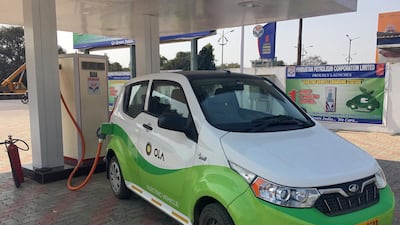India plans to order taxi aggregators like Uber and Ola to convert 40 per cent of their fleet of cars to electric by April 2026, according to a source and records of government meetings to discuss new rules for clean mobility.
Uber and Ola, both backed by Softbank Group, would need to start converting their fleet as early as next year to achieve 2.5 per cent electrification by 2021, 5 per cent by 2022, 10 per cent by 2023 before hiking it to 40 per cent, according to the person and the records reviewed by Reuters.
Some taxi players, like Ola, have previously attempted to operate electric cars in the country, but with little success given inadequate infrastructure and high costs.
New Delhi, however, is looking to push the new policy to boost the adoption of electric vehicles as it tries to bring down its oil imports and curb pollution so it can meet its commitment as part of the 2015 Paris climate change treaty.
Indian think-tank Niti Aayog, chaired by Prime Minister Narendra Modi and which plays a crucial role in policymaking, is working with several ministries on the EV policy.
The recommendations will eventually become a formal policy, with or without changes, subject to approval by the federal government, the source said, adding the idea is to "push electrification through public transport."
Neighbouring China, home to the world's top auto market, is already leading the world in electrification by setting tough EV sales targets for car makers and offering incentives to taxi operators to increase their fleet of clean-fuel cars.
EV sales in India grew three-fold to 3,600 in the year ended March but still account for about 0.1 per cent of the 3.3 million diesel and gasoline cars sold in the country over the period, industry data showed. China's electric car sales, meanwhile, rose 62 per cent in 2018 to 1.3 million vehicles.
In a meeting in New Delhi on May 28, Niti Aayog officials and the ministries of road transport, power, renewable energy and steel, as well as the departments of heavy industries and trade, were among those recommending taxi operators in India gradually convert to electric.
They also recommended that all new cars sold for commercial use should only be electric from April 2026, a change that would also apply to Uber and Ola, said the person who has direct knowledge of the matter but spoke on condition of anonymity.
Motorcycles and scooters sold for commercial purposes, like food delivery or for use by e-commerce companies, will also need to be electric from April 2023, the person added.
India has seen a boom in food delivery apps like Zomato and Swiggy, which counts Naspers and Tencent as investors. Sales by e-commerce firms like Amazon and Walmart-owned Flipkart are also rising.
The committee has also suggested a plan to gradually introduce electric buses within cities, with 5 per cent of the fleet electric by 2023, rising to 30 per cent by 2026. Thereafter all new city buses would need to be electric.

